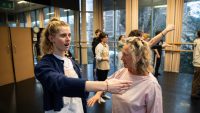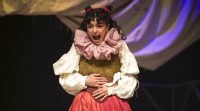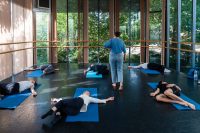Search the website

-
Award
Master of Fine Arts, MFA
-
Application process
Interview
-
Duration
One year (full-time)
-
Academic Year
September 2026 – July 2027
-
Application deadline
Apply by Thursday 19th March 2026 (16:00 GMT)
Course overview
This is an exciting and uniquely designed course providing the opportunity to undertake specialised voice training within an internationally-acclaimed theatre school setting. The course is eclectic in its approach, drawing on a range of approaches and practitioners. The School produces professional-standard productions in a wide range of theatre venues and you will have the opportunity to coach acting students on these productions as part of your studies.
A short taster video
🎭 Learn to apply a range of practical approaches in coaching voice, speech and accent work.
🎭 Coach acting students performing in the School’s professional-standard productions.
🎭 Explore creative approaches to the performance of contemporary and classical drama, poetry, and political speeches.
🎭 Pursue an independent research project in an area of particular interest to you.

Course structure
Over three intensive terms, the course will introduce you to a range of theoretical and practical aspects of voice work enabling you to coach and teach voice, speech, accents and text work within a conservatoire, university or professional company setting.
The course includes a range of theoretical aspects of voice studies work including vocal anatomy and physiology and phonetics, taught in the first and second terms. The emphasis, however, will be on the practical applications of theory through applied modules which run throughout the duration of the course.
This work includes opportunities for you to work on your own voice and speech; to apply an eclectic range of technical and creative approaches to the performance of a wide variety of texts including poetry, Shakespeare and political speeches; and to develop your coaching and teaching practice through working with acting students in training.
You will also undertake research on your own areas of interest. This research will conclude with a ‘practice-based research’ project which may be presented in writing or in an alternative form – for example a short film, a podcast, or presentation and viva.

Launching your career
The aim of the course is to produce self-reflective, entrepreneurial voice practitioners who will work within traditional fields, or go on to develop the practice into new areas. Following graduation, our alumni seek a range of voice-related roles such as voice or dialect coaches for theatre, TV, film or radio; voice directors for theatre productions; voice teachers within conservatoires or university acting departments; and as voice and presentation skills coaches for businesses and other non-performers.
Previous graduates of this course have been successful in securing teaching work at drama schools both in the UK, Europe, Australia and the US; coaching on theatre productions, including in the West End, at drama schools, and regionally; and private coaching for individuals, including both actors and business professionals.

Testimonials
“I have loved everything about my voice and movement classes here. One of my key reasons for coming to drama school was to receive training in these areas (not really understanding what I was asking for) and the training I received here has been beyond my imagination.”
“Sue & Katy are amazing. Their training is so well thought out and delivered. For something that I had no training in before, I feel like I’ve been gently and strongly driven through a course that has had me grow and train up my instrument to a professional standard. “
“The whole team has been so available to us throughout the year. I feel so ready to call myself a professional and enter the industry thanks in massive part to all of their thoughtful training. I really couldn’t tell you how much I’ve loved and appreciated it all enough.”
“BOVTS had the most engaging staff teaching in the most innovative ways.”
-
Awarding body
Bristol Old Vic Theatre School is an associate school of the University of the West of England (UWE Bristol), a Higher Education Provider registered with the Office for Students. On successful completion of this course, you will receive an award from UWE Bristol. Because of the vocational nature of its courses, BOVTS does not award degree classifications – all assessments are completed on a pass or fail basis.
-
Location
This course is taught predominantly at the School’s main site at Downside Road. The course focuses on live, theatre performance but you may have the opportunity to work on audio and film work too.
The School stages theatre productions at venues across Bristol and as part of your coaching practice, you will have the opportunity to work on a production staged in one or more of the city’s many performance spaces. Rehearsals may take place at the Theatre School or in an alternative space in close proximity to the School.
-
Teaching and learning
This course is largely practical but with a theoretical underpinning. It is taught predominantly through practical classes, workshops, small-group lectures, individual projects and through coaching/teaching observation and practice.
The coaching/teaching elements normally take place either within the School in tutorial or class settings or on student productions in theatres. There are normally up to four students on the programme, meaning most of your tuition will be within a small-group setting; you will also be supported through regular individual tutorials with the programme leader.
Contact hours will vary across the year depending on the modules you are undertaking, but on average will be between 10 and 16 hours per week. Your timetabled classes will normally be scheduled on weekdays between 9.00 am and 5.00 pm. However, there may be an occasional requirement for evening and weekend attendance (for example, where you are working on public-facing theatre productions).
You will also need to be capable of working independently and undertaking self-directed research and therefore considerable additional work outside of your scheduled learning time is expected. There are fewer lectures and masterclasses during the summer term to provide opportunity for your individual research which forms part of the Practice and Research module. Further information is available about academic and student support services available to you as a BOVTS student.
Most teaching is delivered in-person. We have retained some online delivery in response to student feedback including for some tutorials and feedback meetings. You may additionally have online masterclasses with industry practitioners who are based remotely, but the majority of tuition will be in the School’s premises.
The course is led by the Head of Voice. Workshops and masterclasses are delivered by both the School’s core staff (for example voice, dialect and acting tutors) and by a range of visiting industry professionals who will share their knowledge and expertise with you.
-
Assessment
The MFA in Professional Voice Studies is an unclassified Master’s of Fine Art degree. This means that on completion of your course, you will not receive a classification (i.e. without distinction, merit or pass).
Assessment at BOVTS is continuous throughout each term and all your modules will be marked on a pass or fail basis. All timetabled classes are compulsory and staff will monitor your progress closely, providing you with regular feedback to help you develop. This includes both verbally in class and in individual tutorials, as well as written feedback at the end of each module. You will also receive feedback from a variety of different staff – for example visiting industry professionals and those working with you on theatre productions. You will be assessed against relevant industry standards and your ability to bring together all aspects of your learning.
Your assessment will be through both practical and written assignments, including a reflective journal, presentations, observations of your coaching/teaching and practice-based research projects, which may be written or presented in an alternative format.
-
Module map
Each module is worth a specified number of credit points. All modules are compulsory, enabling you to cover key subject knowledge while developing your own interests.
🎭 Vocal Anatomy and Physiology (15 credit points)
This module provides an in-depth theoretical and practical exploration of anatomy and physiology relating to voice with an emphasis on understanding approaches and exercises in developing a healthy and sustainable voice.
🎭 Phonetics and Accents (45 credit points)
You’ll gain an in-depth knowledge of the International Phonetic Alphabet and how it can be applied to the study of accents in English. You’ll learn to produce phonetic transcriptions of accents and how to teach and coach accent work.
🎭 Voice, Speech and Text (60 credit points)
This module runs throughout the course and will provide you with the opportunity to work on your own voice and speech, and to acquire a range of technical and creative approaches to the vocal performance of texts including poetry, Shakespeare, and political speeches.
🎭 Practice and Research (60 credit points)
This module runs throughout the course and will provide you with the opportunity to develop your practice in terms of coaching and teaching voice, speech, text work and dialect; and undertaking independent practice-based research in an area of particular interest to you.
-
Entry requirements
Applicants would normally be expected to have an undergraduate degree in a related subject area. However, applicants with extensive relevant professional experience will also be considered on a case-by-case basis. Please see “selection process” for further information, or contact our admissions team for further advice.
If English is not your first language, you will need to demonstrate English language proficiency through a relevant qualification, such as the International English Language Testing System (IELTS). For this course, an overall score of 7.0 is normally required, with a minimum of 7.0 in each component of reading, writing, listening and speaking. Please contact our admissions team for further advice.
-
Selection process
Entry to the MFA Professional Voice Studies course is through an interview. We initially assess your suitability for the interview based on the information you provide on the application form. When selecting candidates, we look at:
🎭 Your motivation and understanding of what a career in a voice-related role might involve;
🎭 Your experience in relevant industries and associated potential to apply this experience to voice coaching;
🎭 Your potential to develop as a practitioner on the course.Interviews for this course are normally held online but it is possible to visit the School ahead of making a final decision. You will be interviewed by two members of staff and will also have the opportunity to ask questions about the programme. There is no application fee for this course.
-
Tuition fees 2026 entry
🎭 Domestic: £16,500
🎭 International: £27,010
We regret that we are unable to consider applications from students requiring a visa to study in the UK during the 2026–27 academic year. For further information, please see the dropdown “Students requiring a visa to study in the UK.”
Accommodation and living costs are not included in your tuition fees.
Further information about financial support from the government, and bursaries and scholarships that you may be eligible to apply for is available from our fees and funding page.
-
Additional costs not included in your tuition fee
There are some additional costs associated with this course that are not covered by your tuition fee. Costs given in brackets are to help with budgeting and are indicative only. These are likely to include:
🎭 clothing and footwear for practical voice and movement classes (£120);
🎭 recommended texts – before buying your own copy, you may wish to see if you can borrow through the UWE library or other loan schemes
🎭 IT equipment – it is recommended that you have your own laptop or computer. You will be given access to the School’s recommended IT specifications for further information.
🎭 equipment such as a small hand-held mirror, a bone-prop and a yoga-style mat (£40)
🎭 stationery, photocopying and printing costs (£50).
A detailed equipment list will be sent to new students ahead of beginning their training. If you are facing financial hardship, then the School may be able to loan you equipment or help you meet these costs with a bursary. New students should contact admissions for further advice.
-
Students requiring a visa to study in the UK
Due to a recent change in the Theatre School’s governance, our Higher Education provider UWE Bristol is unable to issue Confirmation of Acceptance for Studies (CAS) documentation for BOVTS courses. Regrettably we are therefore unable to consider applications from students requiring a visa to study in the UK for 2025 entry.
The Theatre School is able to consider applications from international students who do not require a visa to study in the UK. If you are unsure of your tuition fee status, please consult the UK Council for International Student Affairs guidelines or contact our admissions office for further guidance. Prospective international students for future years of entry are encouraged to join our mailing list to learn more about training at Bristol Old Vic Theatre School.
In the meantime, there are several ways that prospective international students can undertake training with BOVTS:
– We run a series of online masterclasses throughout the year, which are accessible wherever you are in the world. Find out more about what’s coming up on our short courses webpages.
– We offer intensive, in-person short courses for adults throughout the year in acting, creative and production disciplines. These currently range from day-long masterclasses to a ten-week acting foundation course. International students for these courses can normally visit the UK on a standard (holiday) visa, where required. Find out more about what’s coming up on our short courses webpage.
– We run acting international masterclasses in selected destinations throughout the year. Sign up to our prospective student mailing list or follow us on social media to be the first to know when new dates are set.
- Policies and Procedures
